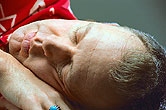Aging Hinders Memory Storage During Sleep
Study in rats suggests brain needs 'experience replay' during slumber.
|
E-mail this article
Subscribe to news
Printer friendly version
|

(SOURCE: Society for Neuroscience, news release, July 29, 2008)
TUESDAY, July 29 (HealthDay News) -- Aging hinders the consolidation of memories during sleep, a process that's crucial for the conversion of fresh memories into long-term ones, say University of Arizona researchers.
The researchers recorded activity in the hippocampus -- a brain region involved in learning and memory -- in 11 young and 11 old rats as they navigated mazes for food rewards. The rats' hippocampal activity was recorded again when they slept.
In the young rats, the sequence of neural activity recorded while they navigated the mazes was repeated while they slept. This was not the case in most of the older rats.
The researchers also found that among both young and old rats, those with the best sleep replay performed the best in their age groups on spatial memory tasks.
"This is the first study to suggest that an animal's ability to perform a spatial memory task may be related to the brain's ability to perform memory consolidation during sleep," study author Carol Barnes said in a Society for Neuroscience news release.
The study is in the July 30 issue of The Journal of Neuroscience.
"These findings suggest that some of the memory impairment experienced during aging could involve a reduction in the automatic process of experience replay," Michael Hasselmo, of Boston University, said in a Society for Neuroscience news release.
Identifying the specific memory deficit in the brains of older adults may be the first step to preventing age-related memory loss, he said.
"This study's findings could inspire the development and testing of pharmacological agents designed to enhance memory replay phenomena," Hasselmo said.
More information
The American Academy of Family Physicians has more about age-related memory loss. 
Copyright © 2008 ScoutNews, LLC. All rights reserved. 
HealthDayNews articles are derived from various sources and do not reflect federal policy. healthfinder.gov does not endorse opinions, products, or services that may appear in news stories. For more information on health topics in the news, visit the healthfinder.gov health library.